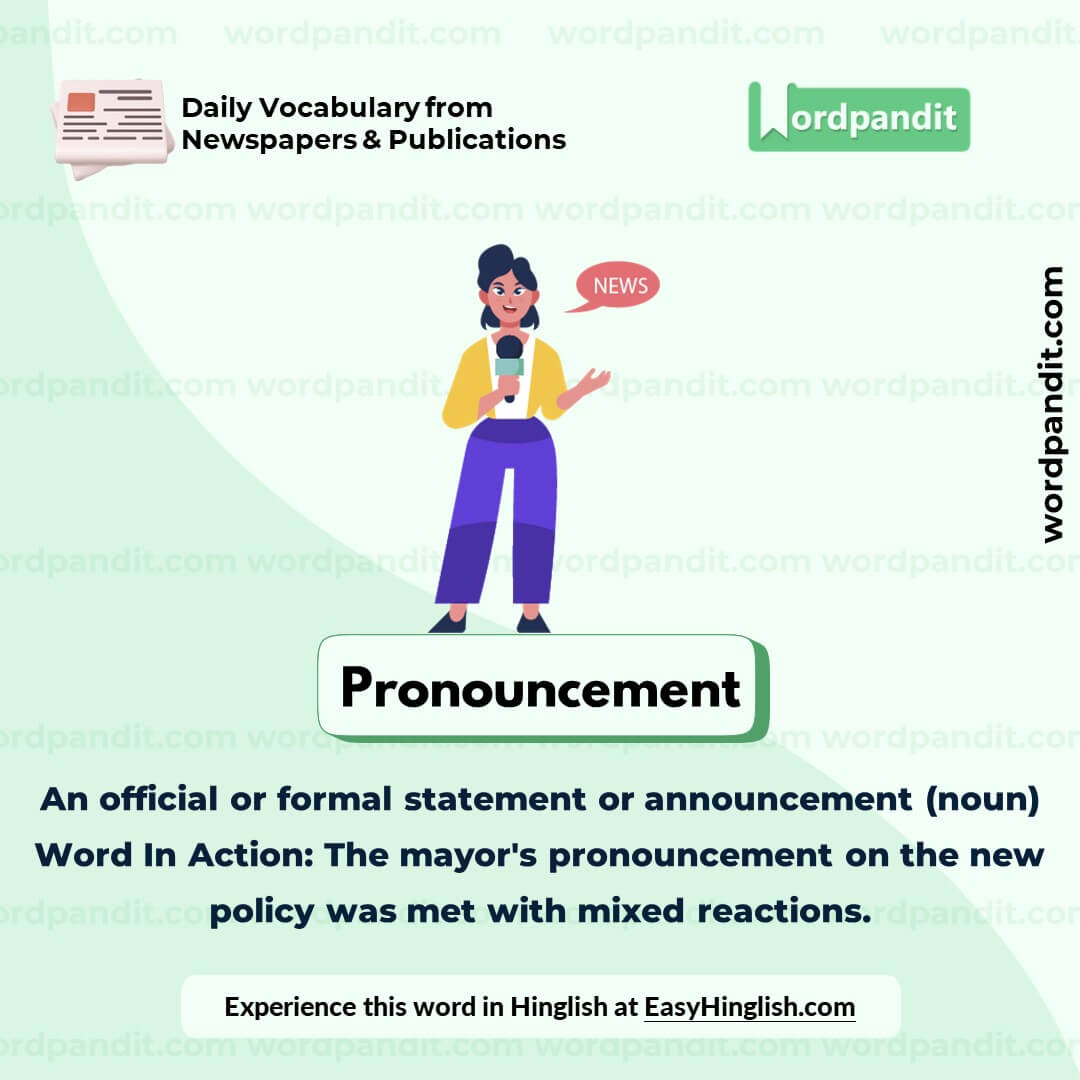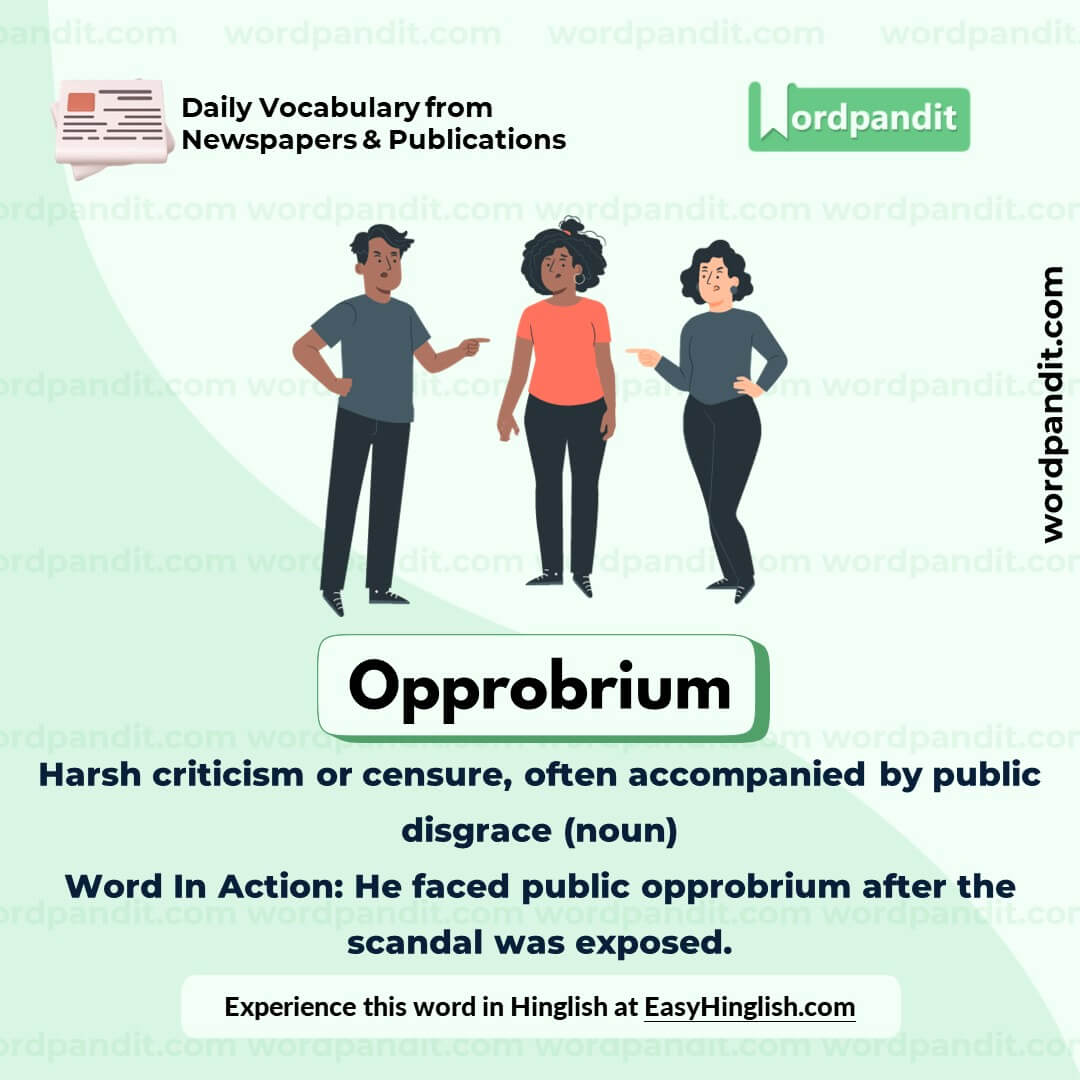Daily Vocabulary from International Newspapers and Publications
Expand Your Vocabulary with Wordpandit’s Global Vocabulary Hub
At Wordpandit, we are committed to helping you develop a truly global vocabulary by drawing from some of the most respected international publications. This section is designed to keep you ahead of the curve by introducing you to words that define global conversations and trends.
The Power of Global Sources
To help you think and communicate on a global scale, we curate vocabulary from renowned international sources, such as:
- The New York Times
- The Washington Post
- BBC
- The Guardian
- The Economist
- Scientific American
- Psychology Today
- And many more...
Stay Global, Stay Competitive
Our daily updates from international publications ensure you are consistently exposed to new words that reflect global news and developments, making sure your vocabulary is not only current but also globally relevant.
Enhance Your Global Perspective
Whether you’re preparing for international exams, aiming to excel in global business communication, or want to enhance your language skills for personal growth, Wordpandit offers the resources you need to thrive in a global context.
Effective Learning, Global Reach
Our learning methodology combines global examples, memory aids, and interactive activities, allowing you to internalize new words effectively and apply them in real-world scenarios.
Begin Your Global Vocabulary Journey Now!
Why Choose Wordpandit?
Practical Learning: Focus on words you'll actually encounter in real-world reading, enhancing your comprehension and communication skills.
Diverse Content: From current affairs to scientific breakthroughs, our varied sources expose you to vocabulary across multiple domains.
Effortless Integration: Make Wordpandit a part of your daily routine. Just a few minutes each day can significantly boost your lexicon over time.
Your Path to Vocabulary Mastery
- Visit our Daily Vocabulary section regularly
- Explore new words and their usage in context
- Practice incorporating these words into your own writing and speech
- Track your progress as your vocabulary expands
Start Your Journey Today
Embark on your vocabulary enhancement journey with Wordpandit. By consistently engaging with our daily posts, you'll build a robust vocabulary that serves you well in academic, professional, and personal contexts.
Remember, a word a day keeps linguistic limitations at bay. Make Wordpandit your daily companion in the quest for vocabulary excellence!
WORD-1: Pronouncement
Context:
"Pronouncements as a return to radical subjectivism, to the notion that our knowledge of the world is conjured only in the mind without reference to a real external world. It did not help that Bohr." - Aeon
Explanatory Paragraph:
A "pronouncement" is a formal or authoritative declaration made to convey an important decision, statement, or viewpoint. It often implies a degree of official or ceremonial significance and carries weight due to the authority of the person or entity making it. In philosophical or scientific contexts, pronouncements can spark debate by challenging existing ideas or presenting novel perspectives.
Meaning: An official or formal statement or announcement (noun).
Pronunciation: proh-NOUNS-ment
Difficulty Level: ⭐⭐⭐ Intermediate
Etymology: Derived from the Latin word "pronuntiare," meaning "to proclaim or announce," through Old French "prononcer."
Synonyms & Antonyms:
Synonyms: Declaration, announcement, proclamation, statement
Antonyms: Silence, denial, question
Usage Examples:
- The president's pronouncement on climate policy was met with widespread approval.
- The professor's pronouncement about the origins of consciousness sparked a heated debate.
- Her pronouncement of love came as a pleasant surprise to everyone.
- The company's CEO made a bold pronouncement about its future direction.
Cultural Reference:
"The papal pronouncements during the Reformation period had a profound impact on European history and culture." - Historical Archives
Think About It:
Why do you think formal pronouncements carry more authority compared to informal opinions, and how does this affect societal decision-making?
Quick Activity:
Write a mock pronouncement on a topic of your choice (e.g., environmental policy, education reform) and share it with a friend for feedback.
Memory Tip:
Think of "pronounce" (to say something clearly) + "-ment" (a suffix for nouns) = "pronouncement," a clear and formal statement.
Real-World Application:
Pronouncements are often used in legal, political, and philosophical contexts to assert authority or provide clarity on complex issues. Understanding them helps in analyzing official documents, speeches, and public declarations.
WORD-2: Strenuous
Context:
"Despite his strenuous efforts to exercise care in his use of language, Bohr could be notoriously vague and more than occasionally incomprehensible." - Aeon
Explanatory Paragraph:
The word "strenuous" describes an activity or effort requiring significant energy, vigor, and determination. It often refers to tasks that are physically or mentally demanding, emphasizing the intensity or dedication needed to accomplish them. It can also apply to people who display vigorous and tireless effort in their endeavors.
Meaning: Requiring or using great exertion (adjective).
Pronunciation: STREN-yoo-uhs
Difficulty Level: ⭐⭐⭐ Intermediate
Etymology: Originates from the Latin "strenuus," meaning "active or vigorous," and entered English through Late Middle English.
Synonyms & Antonyms:
Synonyms: Arduous, vigorous, laborious, demanding
Antonyms: Easy, effortless, relaxed, simple
Usage Examples:
- The strenuous hike up the mountain left everyone exhausted but exhilarated.
- She made strenuous efforts to ensure the project was completed on time.
- His strenuous objections to the policy changes sparked a heated debate.
- Strenuous physical activity is not recommended for people recovering from surgery.
Cultural Reference:
"The strenuous endeavors of early explorers, such as Ernest Shackleton, exemplify the human spirit's resilience in the face of adversity." - Historical Narratives
Think About It:
Why do you think strenuous efforts are often seen as a virtue in personal and professional contexts?
Quick Activity:
List three strenuous tasks you’ve done recently and reflect on what made them challenging and how you overcame them.
Memory Tip:
Think of "strain" (to exert oneself) + "-uous" (a suffix implying a state or quality) = "strenuous," requiring great effort.
Real-World Application:
Understanding "strenuous" helps in describing situations that demand effort, whether in physical activities like workouts or in mental tasks such as intense problem-solving sessions.
WORD-3: Opprobrium
Context:
"Such efforts garnered little support from the wider scientific community and attracted plenty of opprobrium." - Aeon
Explanatory Paragraph:
"Opprobrium" refers to strong disapproval or public criticism directed at someone, often due to shameful or improper behavior. It conveys a sense of moral condemnation and is typically used in contexts where a person or idea is widely censured by others. The word suggests an intensity of criticism that can be both verbal and social.
Meaning: Harsh criticism or censure, often accompanied by public disgrace (noun).
Pronunciation: uh-PROH-bree-um
Difficulty Level: ⭐⭐⭐⭐ Advanced
Etymology: Derived from the Latin "opprobrum," meaning "disgrace or reproach," combining "ob-" (against) and "probrum" (disgraceful act).
Synonyms & Antonyms:
Synonyms: Disgrace, condemnation, criticism, reproach
Antonyms: Praise, honor, respect, admiration
Usage Examples:
- The scandal brought opprobrium upon the politician, leading to his resignation.
- Her controversial remarks attracted opprobrium from both colleagues and the public.
- The company faced opprobrium for its unethical labor practices.
- Despite the opprobrium he endured, the scientist remained steadfast in his beliefs.
Cultural Reference:
"During the Salem witch trials, individuals accused of witchcraft often faced social opprobrium, which isolated them from their communities." - Historical Accounts
Think About It:
What factors determine whether public criticism becomes opprobrium, and how does it impact the person or group at its center?
Quick Activity:
Write a short paragraph describing a historical figure who faced opprobrium and analyze how they responded to it.
Memory Tip:
Think of "opposition" + "problem" to recall "opprobrium," which arises when someone is opposed due to a serious problem or disgrace.
Real-World Application:
Understanding "opprobrium" is crucial for analyzing social and political scenarios where public criticism plays a significant role, such as controversies, scandals, or ethical debates.
WORD-4: Garnered
Context:
"Such efforts garnered little support from the wider scientific community and attracted plenty of opprobrium." - Aeon
Explanatory Paragraph:
"Garnered" means to gather or collect something, especially information, support, or approval, often as a result of effort or careful planning. It implies a process of accumulating or earning something valuable, whether tangible or intangible. The word is frequently used in formal or literary contexts.
Meaning: To gather, collect, or earn something, particularly through effort (verb).
Pronunciation: GAHR-nerd
Difficulty Level: ⭐⭐ Beginner
Etymology: Originates from the Old French "gerner," meaning "to gather grain," which comes from the Latin "granarium," meaning "granary" or "storehouse."
Synonyms & Antonyms:
Synonyms: Accumulate, collect, amass, gather
Antonyms: Disperse, scatter, lose
Usage Examples:
- The artist's latest work garnered widespread acclaim from critics and fans alike.
- His campaign garnered support from all corners of the city.
- The team garnered valuable insights from the customer feedback survey.
- She garnered enough evidence to support her argument in the debate.
Cultural Reference:
"The civil rights movement garnered momentum in the 1960s, leading to landmark legislative changes." - Historical Events
Think About It:
What strategies do people or organizations use to garner public support for their causes?
Quick Activity:
Think of a project or goal you’ve worked on. Write a few sentences describing how you garnered support or resources to achieve it.
Memory Tip:
Picture a farmer "garnering" grain in a granary to recall that "garnered" means gathering or collecting.
Real-World Application:
"Garnered" is often used in professional and academic contexts to describe how support, results, or information are gathered effectively, making it useful for reports, presentations, and analyses.
WORD-5: Contradictory
Context:
"Describe our experiments and their results using seemingly contradictory, but nevertheless complementary, concepts of waves and particles borrowed from classical (pre-quantum) physics." - Aeon
Explanatory Paragraph:
The word "contradictory" refers to statements, ideas, or concepts that are in direct opposition to each other and cannot coexist logically. Something contradictory suggests inconsistency or mutual exclusivity. However, in some contexts, such as paradoxes or advanced theories, seemingly contradictory elements can work together in unexpected ways.
Meaning: Mutually opposed or inconsistent; logically incompatible (adjective).
Pronunciation: kon-truh-DIK-tuh-ree
Difficulty Level: ⭐⭐⭐ Intermediate
Etymology: Derived from the Latin "contradictorius," meaning "opposed or inconsistent," combining "contra" (against) and "dicere" (to say).
Synonyms & Antonyms:
Synonyms: Inconsistent, opposing, conflicting, paradoxical
Antonyms: Consistent, compatible, harmonious, agreeing
Usage Examples:
- The politician's contradictory statements confused voters and fueled skepticism.
- The theory was built on seemingly contradictory principles that were later shown to be complementary.
- Her actions were contradictory to her earlier promises, leading to trust issues.
- The contradictory findings in the study required further investigation.
Cultural Reference:
"The wave-particle duality in quantum mechanics is a classic example of how contradictory ideas can coexist within a unified framework." - Scientific Theories
Think About It:
Can two contradictory ideas ever both be true in different contexts? Provide examples to support your view.
Quick Activity:
Write a short paragraph explaining a situation where you encountered contradictory advice and how you resolved the conflict.
Memory Tip:
Think of "contra" (against) + "dictory" (related to speaking), as in two people "speaking against" each other, to recall "contradictory" means mutually opposed.
Real-World Application:
The concept of "contradictory" is useful in fields such as philosophy, science, and law, where resolving apparent contradictions often leads to deeper understanding or innovative solutions.


















